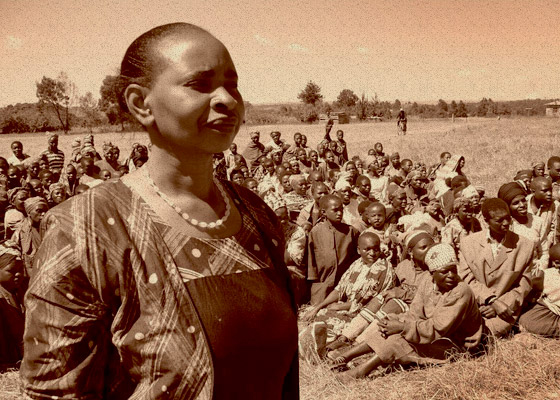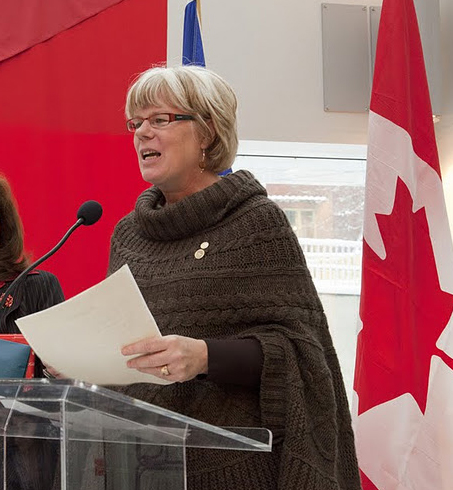
McGill Nurses for Highlands Hope’s project receives Grand Challenges Canada funding for HIV peer education program in Tanzania
By Meaghan Thurston
In a hospital in a remote part of Tanzania with little access to health care tools tools – not even a telephone – in an area with one of the highest HIV rates in the world, public health nurse Betty Liduke has been scrambling to support an ever-increasing population of people who were HIV positive. Specifically, she had been looking for partners to help her launch a peer-education program in her community. Today, that dream is a reality, with a little help from her friends – writer and former CBC broadcaster Royal Orr, and McGill’s Madeleine Buck of the Ingram School of Nursing and McGill Nurses for Highlands Hope. The project has just received its first major funding boost from Grand Challenges Canada (GCC).
On May 22, it was announced that the McGill Nurses for Highlands Hope program, of which Buck is Chair, has been awarded a $112,000 GCC Stars in Global Health award for the project ‘Turning hope into action: Youth peer health education in rural Tanzania,’ a site-specific HIV/AIDS youth peer health education program in primary schools.
The project is designed to empower youth in making healthy decisions and to address the huge gaps in knowledge around HIV transmission. The Njombe region has the highest prevalence of HIV in the country (14.8 per cent), with the incidence increasing in young adults. The situation is compounded because no formalized HIV education program exists in local schools, and orphaned youth often receive no guidance about how to prevent HIV transmission.
Buck and Liduke are co-investigators on the pilot tested-project, which follows best practices in health education around sexuality. To date, the program has trained 20 peer-educators, and has been implemented in six primary schools. One student, Cornell, has already organized voluntary counseling and testing sessions at his school. The program has had more volunteers express interest than Liduke and Buck could afford to train.
With the funding from the Grand Challenges Program, Buck hopes to see the program extend its reach.

“Grand Challenges Canada supports ‘bold ideas’ and while youth peer education isn’t particularly bold – because it’s been implemented in a number of areas – what is bold about our program is that it is designed to be sustainable and to make a difference in a setting with as so few resources as Njombe,” said Buck.
According to Buck, the McGill-Njombe connection, like all great relationships, was the result of passionate advocacy, strong networking, and good timing. Inspired by Orr’s video documentary work on HIV/AIDS in Africa, and urged by Orr himself, Buck first travelled Njombe region in 2006, accompanied by Dr. Norbert Gilmore, one of Canada’s foremost experts on HIV, neurology resident Roy Baskind, and the Gazette’s resident cartoonist Terry Moser, aka Aislin, who documented the trip for the Montreal Gazette.
It was on this trip that Buck met Liduke, “who is excellent at networking” – a meeting that changed Buck’s course as a scholar and a public health educator, and has provided new opportunities for McGill’s nursing students, and most importantly, has already had a positive impact on some of Tanzania’s most vulnerable youth.
“I really connected with Betty. While I knew a lot about public health, I knew nothing about HIV, but I wanted to start scholarly work in global health,” says Buck. “In 2006, McGill had just launched our Global Health Master’s program and we were looking for sites for our students. The timing was right.”
Soon after Buck’s first trip to Njombe, two of McGill’s faculty members, Sylvie Lambert and Christina Clausen, and two Global Health nursing students, went to the region and spent 3 ½ months putting in place basic documentation and infrastructure for the work of nursing – all the while helping to give voice to the nurses working in the hospital. The McGill students addressed issues of homecare for the ill and adherence to anti-retroviral medication, which had only just been introduced in the region, almost 15 years after they had been introduced in Canada.
“The McGill connection has helped Betty network with government officials [in Tanzania] and to get primary school aged youth involved in education. What [McGill’s nurses] have learned is that you have to take a grass-roots approach to this work.” says Buck.
McGill Nurses for Highlands Hope program, established in 2006, provides education and practice opportunities between McGill University’s School of Nursing and Highlands Hope Umbrella, a nongovernment organization that brings together community, professional, and volunteer networks to address the challenge of HIV/AIDS and related social problems in Njombe. To date there have been four faculty exchanges and three fellowships in symptom management, adherence to antiretroviral therapy, home-based care, physical assessment, computer literacy and nursing role development.
“Each project built on the other, and it soon became apparent that there was a lot more to this work than just HIV education. It is about advocating for nursing,” says Buck.
To learn more about the project see Grand Challenges Canada.
Learn more about McGill Nurses for Highlands Hope Project.
